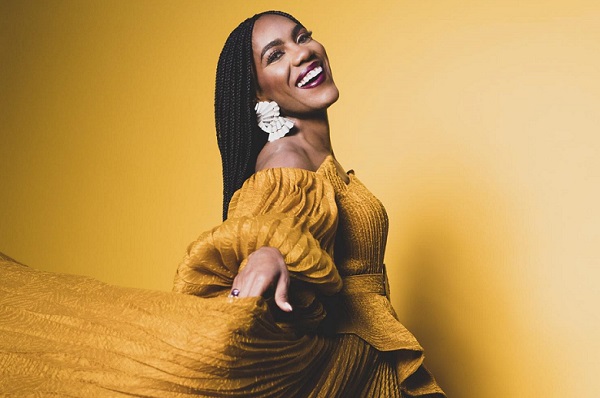 United States Various, ‘Notes on Hope’: J’Nai Bridges (mezzo-soprano), Ulysses Owens Jr. (percussion), Reuben Rogers (string bass), Carol Robbins (harp), Ted Rosenthal (piano), David Rosenthal (guitar), Jalen Baker (vibraphone). San Francisco Performances, Herbst Theatre, San Francisco, 28.4.2023. (HS)
United States Various, ‘Notes on Hope’: J’Nai Bridges (mezzo-soprano), Ulysses Owens Jr. (percussion), Reuben Rogers (string bass), Carol Robbins (harp), Ted Rosenthal (piano), David Rosenthal (guitar), Jalen Baker (vibraphone). San Francisco Performances, Herbst Theatre, San Francisco, 28.4.2023. (HS)

‘Divine Hope’
Traditional – ‘The Lord’s Prayer’
Ellington – ‘Heaven’
Traditional – ‘There Is a Balm in Gilead’
‘The Crux of Hope’
Geri Allen – ‘Skin’
Satie – ‘Je te veux’
T. Rosenthal – ‘Always Believe’ (from Dear Erich)
Henrique – ‘Boi Bamba’
‘Hope Fulfilled’
Price – ‘Hold Fast to Dreams’, ‘Adoration’
Previn – ‘It’s Good to Have You Near Again’
Jazz and classical music are no strangers to one another. Ever since jazz emerged as its own musical art form in the early part of the twentieth century, musicians in both genres have sought out each other. George Gershwin’s music appears on symphony orchestra programs, and jazz artists routinely adapt classical pieces. Debussy, Satie and Ravel influenced countless jazz pianists.
Opera singers are no strangers to the lures of jazz. Renée Fleming is not the only singer comfortable and excellent in both categories. Mezzo-soprano J’Nai Bridges, who has sung starring roles at major opera venues from San Francisco to Verona, and jazz percussionist Ulysses Owens Jr., who has played with such high-level artists as Kurt Elling and Christian McBride, combined their musical chops to devise a different kind of recital.
‘Notes on Hope’ paired the singer with a jazz sextet led by Owens. The instrumentation included harpist Carol Robbins, who excels in both classical music and jazz. Pianist Ted Rosenthal even wrote a jazz opera, performed by New York City Opera in 2019. Jazz guitarist David Rosenthal, vibraphonist Jalen Baker and bassist Reuben Rogers are all in demand in jazz.
With that instrumentation, it is no surprise that the classical pieces on the program took on a distinctly jazzy air, complete with improvisation and interpolated blue notes, all the while keeping a steely focus on the virtuosity required in both styles. Traditional gospel and church music went shoulder to shoulder with works by composers such as Duke Ellington, Florence Price and André Previn, all of whom embraced both the jazz and classical worlds in their music.

If at times Bridges leaned a bit too strongly on her ‘opera’ voice instead of backing off to keep it limber and flexible for jazz elements, she brought her usual musical intelligence to bear on the program, which was divided into three parts. ‘Divine Hope’ framed Duke Ellington’s ‘Heaven’ with the familiar Malotte version of ‘The Lord’s Prayer’ and the gospel church version of ‘There Is a Balm in Gilead’.
‘The Crux of Hope’ started with the late jazz composer Geri Allen’s all-instrumental ‘Skin’, in which each of the players took a distinctly different tack on the theme in a rambunctious performance. But then came one of Bridges’ most effective moments, finding both delicacy and soul in ‘Je te veux’ (‘I want you’), French Impressionist Erik Satie’s love song, which began with just her and the harp and sailed softly like a glider. ‘Always Believe’ – from Rosenthal’s opera, Dear Erich – was less charming, and the section wrapped up with ‘Boi Bamba’, a bouncy Latin jazz tune that moved a bit too slowly to make the best impression.
The third part, ‘Hope Fulfilled’, started with two pieces by Florence Price, the first African-American woman composer to be played by a major symphony orchestra, who only recently has been rediscovered. Bridges sang ‘Hold Fast to Dreams’ with commendable simplicity, even as it soared into anthem territory at the finish, and the ensemble played ‘Adoration’ (which Price wrote for church organ and later arranged for solo violin and string orchestra) with a wonderful sense of occasion. Baker’s vibe solo was particularly arresting.
At the urging of singer Michael Feinstein, they finished the concert with André Previn’s ‘It’s Good to Have You Near Again’, a song he famously recorded with Leontyne Price. He was right: the music fit these musicians perfectly.
Bridges and Owens met in San Francisco when she was singing the title role in Carmen at the opera, and he was in town with a jazz ensemble. Bridges harked back to that moment with a single encore. Accompanied only by piano, she delivered a sassy ‘Habanera’ from Bizet’s score, weaving in just enough deft jazz gestures to make it deeply sexy.
Harvey Steiman
